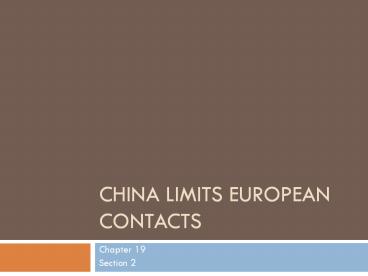China Limits European contacts - PowerPoint PPT Presentation
1 / 26
Title:
China Limits European contacts
Description:
CHINA LIMITS EUROPEAN CONTACTS Chapter 19 Section 2 Key Terms Ming Dynasty Hongwu Yonglo Zheng He Manchus Qing Dynasty Kangxi The Rise of the Ming China became a ... – PowerPoint PPT presentation
Number of Views:324
Avg rating:3.0/5.0
Title: China Limits European contacts
1
China Limits European contacts
- Chapter 19
- Section 2
2
Key Terms
- Ming Dynasty
- Hongwu
- Yonglo
- Zheng He
- Manchus
- Qing Dynasty
- Kangxi
3
The Rise of the Ming
- China became a dominant power
- Vassals states in Korea paid the Ming tribute
- China expected the same from Europeans
- Was not going to let outsiders threaten peace and
prosperity
4
The Rise of the Ming
- Ming had ended Mongol rule
- Hongwu- a peasants son who drove the Mongols out
- Ruled from Yuan capital
- Restored destroyed fields
- Erased all traces of the Mongol past
5
The Rise of the Ming
- Hongwus agriculture reforms increased rice
production and irrigation - Encouraged fish farming, growing crops (cotton,
sugar cane) - Brought stability to China
6
The Rise of the Ming
- Encouraged a return to Confucian moral standards
- Improved on restoring merit based civil service
- Hongwu became a ruthless tyrant
- Purged the government
- Killed thousands of officials
7
The Rise of the Ming
- Hongwus death in n1398 led to a power struggle
- Yonglo his son emerged victorious
- Moved the royal Court to Beijing
- Yonglo had a curiosity of the outside world
- Launched 7 voyages of exploration
8
The Voyages of Zeng He
- Chinese admiral who led all seven voyages
- Large distances, large fleet, large ships
- Went from Southeast Asia to Africa
- Fighting ships, storage vessels
- Treasure ships measuring over 400 feet
9
The Voyages of Zeng He
- 27,000 people in the crew
- Sailors, soldiers, carpenters, accountants,
doctors and religious leaders - Distributed gifts of silks and silver to show
superiority - 156 countries sent tribute to the Ming court
- After 7th voyage China withdrew in isolation
10
Ming Relations with Foreign Countries
- Trade policies in the 1500s isolation
- Only government could conduct foreign trade
- Only trade through three ports
- Canton
- Macao
- Ningbo
11
Ming Relations with Foreign Countries
- Profited minded merchants smuggled goods
- Europeans paid with silver from American mines
- Silk-making and ceramics grew rapidly
- Manufacturing and commerce grew rapidly
12
Ming Relations with Foreign Countries
- Idea of commerce offended Confucian beliefs
- Money supported foreigners who were robbers
- Chinese policies favored agriculture
- Taxes on manufacturing skyrocketed, agriculture
stayed low
13
Ming Relations with Foreign Countries
- Missionaries accompanied traders to China
- Brought Christianity, knowledge of European
science and technology (clock) - Matteo Ricci- first Jesuit to have an impact
14
Manchus Found Qing Dynasty
- Higher taxes and bad harvest pushed peasants to
starvation - 1644 Manchus people invade China
- Seized Beijing and became the leader
- Upheld Confucian beliefs
- Qing Dynasty will rule for 260 years
15
China Under Qing
- Resisted the rule of non-Chinese Manchus
- Reduced government expenses and reduced taxes
- Scholar and patron of the arts
- Company of Jesuits in his court
16
China under Qing
- Jesuits taught him mathematics, science and
medicine - Qian-long (grandson) ruled from 1736-1795
- China reached its greatest size and prosperity
- Expanded European missionaries in China
17
Manchus Continues Chinese Isolation
- Middle kingdom was the center of the universe fro
2,000 years - Foreign states wanted to trade they had to follow
Chinese rules - Use only special ports and pay tribute
- Dutch accepted Chinese restrictions
18
Manchus Continues Chinese Isolation
- Kowtow ritual-kneeling in front of the emperor
and touching your head nine times - Dutch sold tea, silk and porcelain
- 1800 tea was 80 of the shipments
- Great Britain did not like Chinese restrictions
19
Manchus Continues Chinese Isolation
- Britain refused to kowtow and China declined the
invite to trade - China was self sufficient and did not need the
British
20
Korea Under Manchus
- Manchus had conquered Korea
- Korea organized their government under Confucian
ideas - They adopted Chinese technology
- Chinese invasion and Japanese attacks provoked
strong feelings of nationalism
21
Korea Under Manchus
- Sentiment was evident in their art
- Many artists showed popular Korean scenes
22
Life in Ming and Qing China
- Most families farmed the land
- Farmers grew more than rice (sweet potatoes,
corn) - Food production increased, population followed
- Families favored sons over daughters
23
Life in Ming and Qing China
- Only sons could perform vital religious rituals
- Females were not valued
- Many female infants were killed
- Men dominated the households
24
Life in Ming and Qing China
- Women had a lot of responsibilities
- Supervised childrens education
- Worked the fields
- Managed the family finances
- Women force to remain secluded in their homes
- Worked as midwives or textiles
25
Cultural Developments
- Chinese fiction written during this period
- Dream of the Red Chamber by Cao Zhan
- Examines upper class society in the 1700s
- Valued techniques over creativity
- Pottery needed technical skill
26
Cultural Developments
- Experimentation led to production of high quality
ceramics and porcelain - Drama was popular entertainment
- Plays presented Chinese history and heroes
- Helped to unify and Chinese society by creating a
national culture

